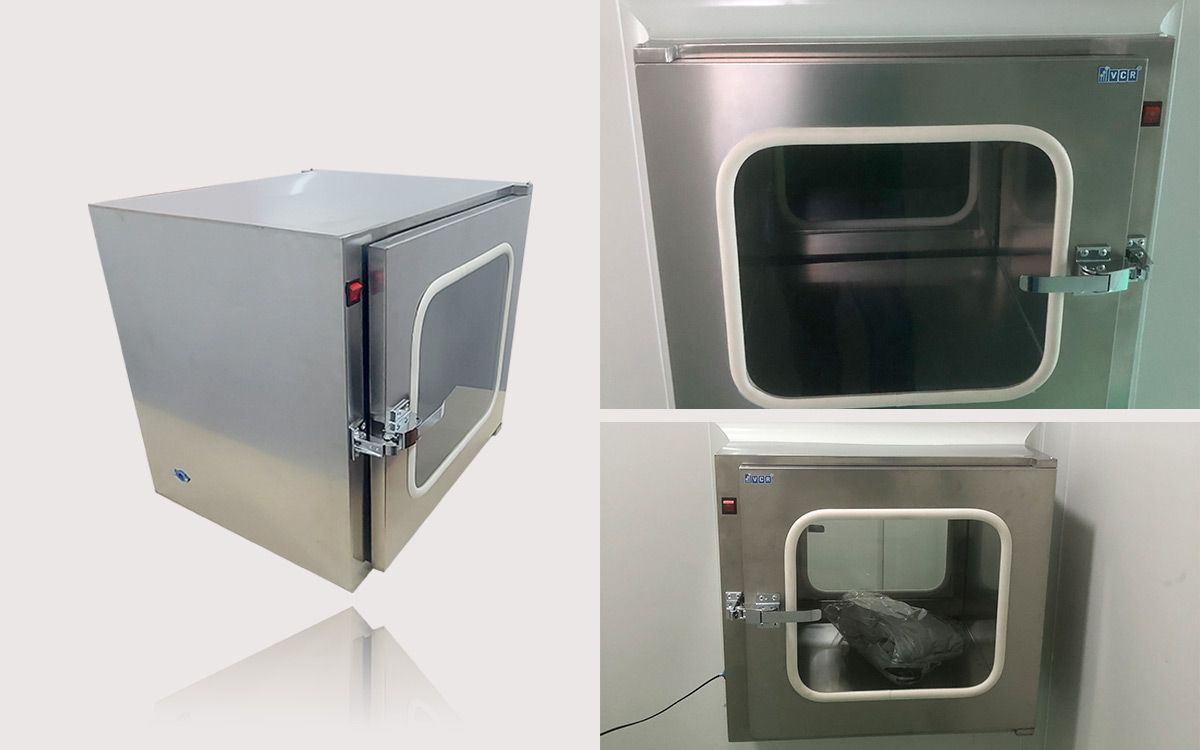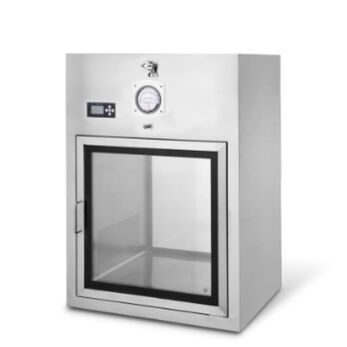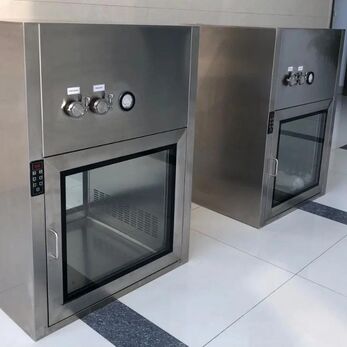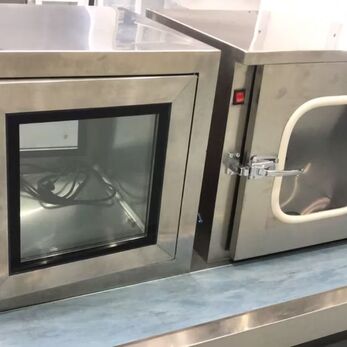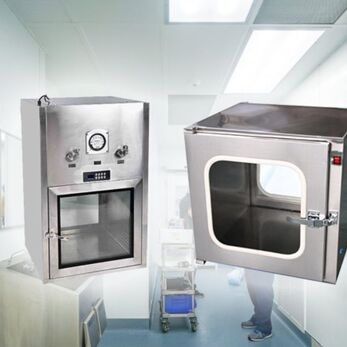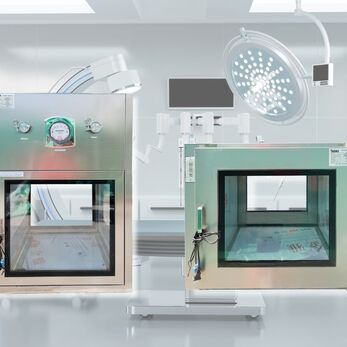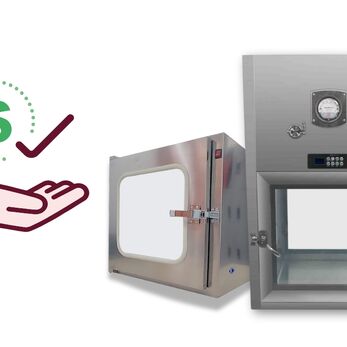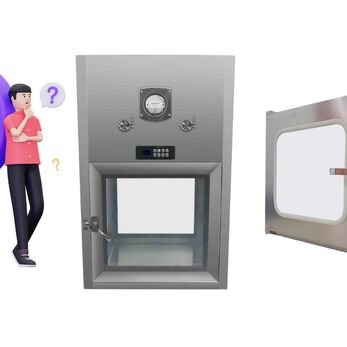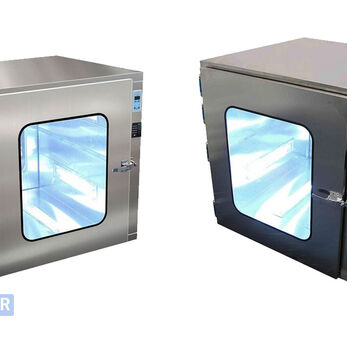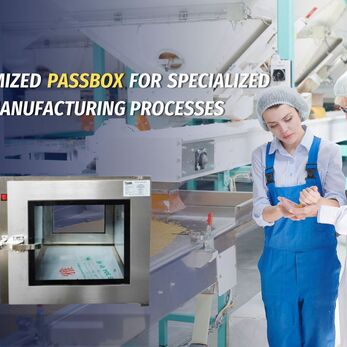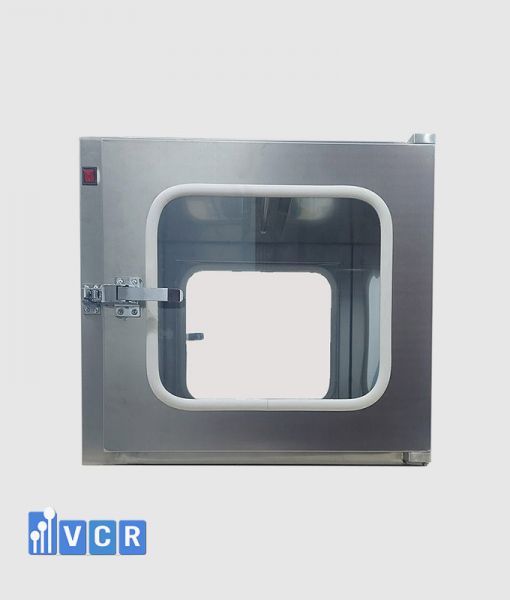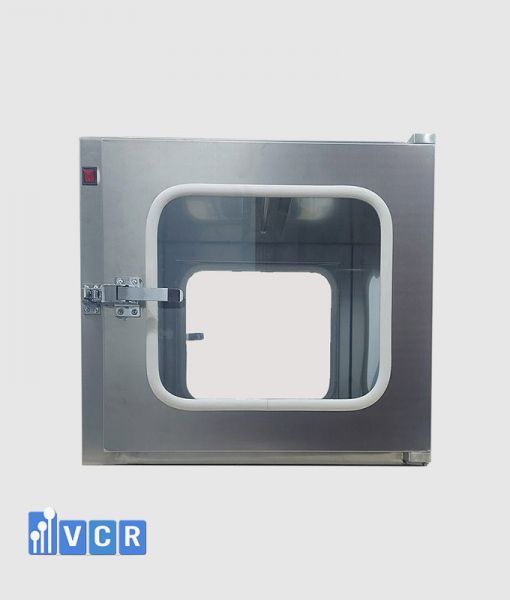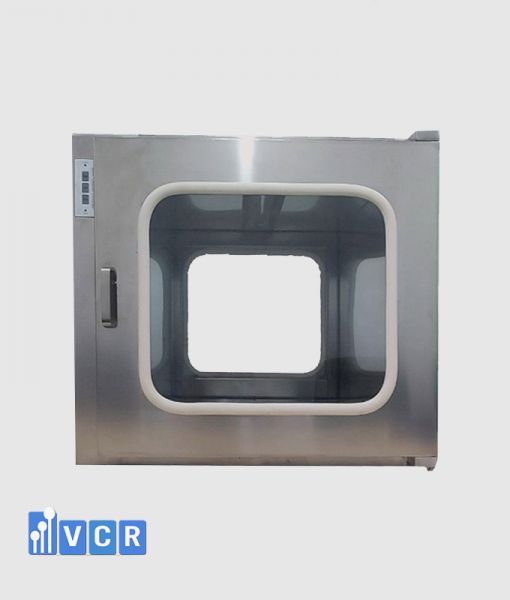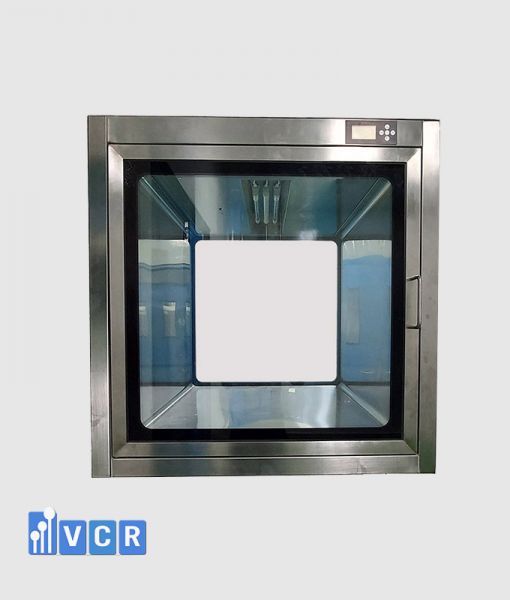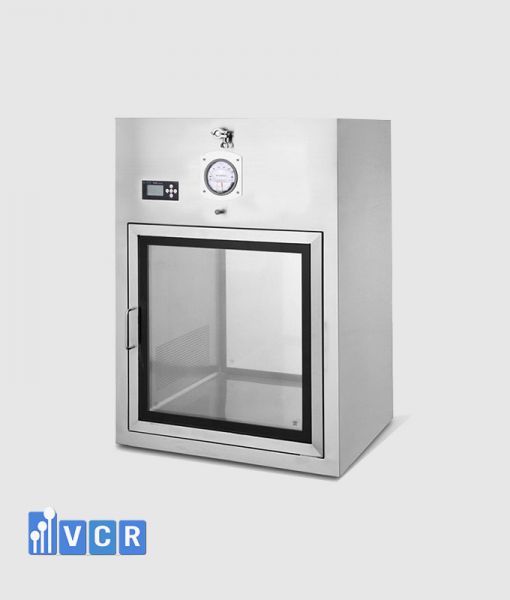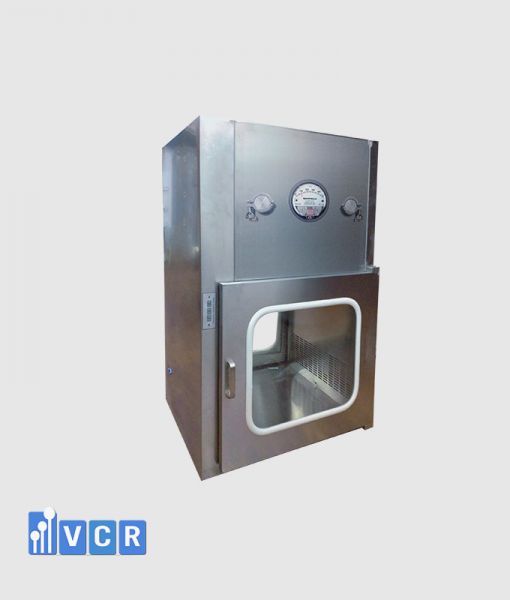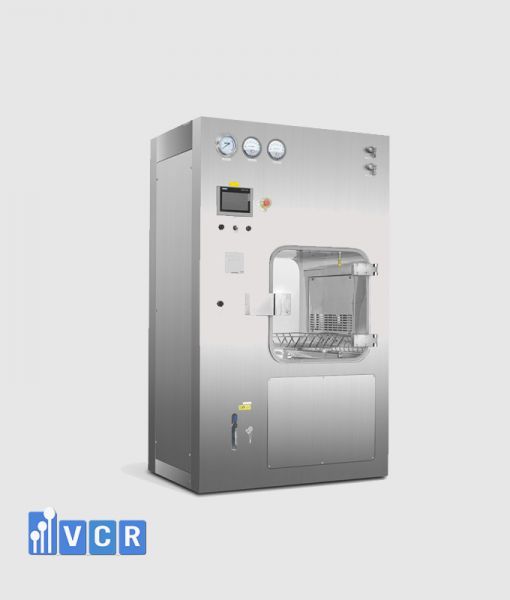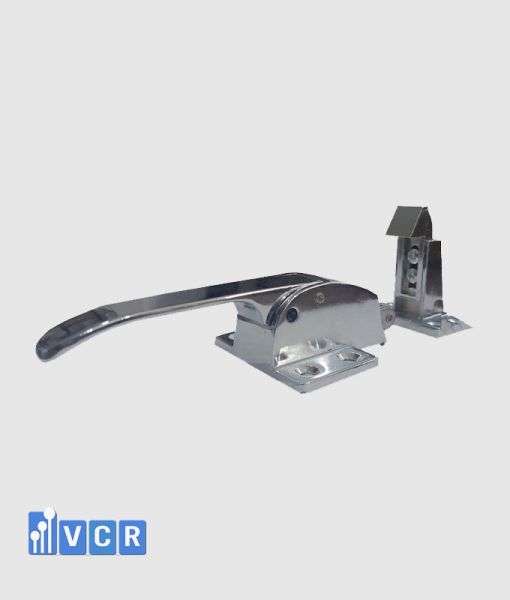The Pass Box is a material transfer device between cleanroom areas, helping to reduce the risk of cross-contamination and maintain cleanliness levels in cosmetic production. Designed to meet GMP/ISO 22716 standards, VCR’s Pass Box ensures a safe, efficient process that fully complies with strict hygiene requirements.
- 1. Introduction to the Clean Room Pass Box Used in the Cosmetics Industry
- 2. Why Does the Cosmetics Industry Require a Standard-Compliant Pass Box?
- 3. Criteria for Choosing a Pass Box for a Cosmetic Clean Room
- 4. Trusted Supplier of Clean Room Pass Boxes for Cosmetics – VCR
- 5. Pass Box Pricing in the Cosmetics Industry – What Does It Depend On?
- 6. FAQ – Frequently Asked Questions About Clean Room Pass Boxes for Cosmetics
1. Introduction to the Clean Room Pass Box Used in the Cosmetics Industry
A Pass Box is a material transfer device placed between two clean-room areas with different cleanliness levels, designed to minimize direct door openings and limit ingress of contaminated air. In the cosmetics industry, the Pass Box plays an especially important role in controlling the risk of cross-contamination between production stages.
Roles of a Pass Box in cosmetics manufacturing
The cosmetics industry demands stringent hygiene standards, especially for preservative-free products or those manufactured under GMP standards. Using a clean room Pass Box helps:
-
Safely transfer raw materials, semi-finished products and finished products between production zones.
-
Minimize the risk of microbial contamination and fine dust, thereby ensuring consistent product quality.
-
Maintain pressure and cleanliness level separation between sub-zones, particularly in closed-loop processes.
In addition, some types of Pass Boxes integrate UV lamps or HEPA filters, helping sterilize the surfaces of transferred materials and enhance microbial safety.
Typical installation locations of Pass Boxes in cosmetics factories
Depending on the layout and production process, Pass Boxes are often installed at positions such as:
-
From raw‐material warehouse → production room: to bring materials into the clean area without affecting the environment inside.
-
From formulation room → filling/packaging room: unidirectional transfer of semi‐finished goods, reducing cross‐contamination.
-
From production room → QC room or finished-goods warehouse: ensuring that completed products are transferred away without re-contaminating the clean area.
Properly locating a Pass Box from the start helps optimize the cosmetics production process and ensures compliance with GMP, ISO 14644 or ISO 22716 standards.
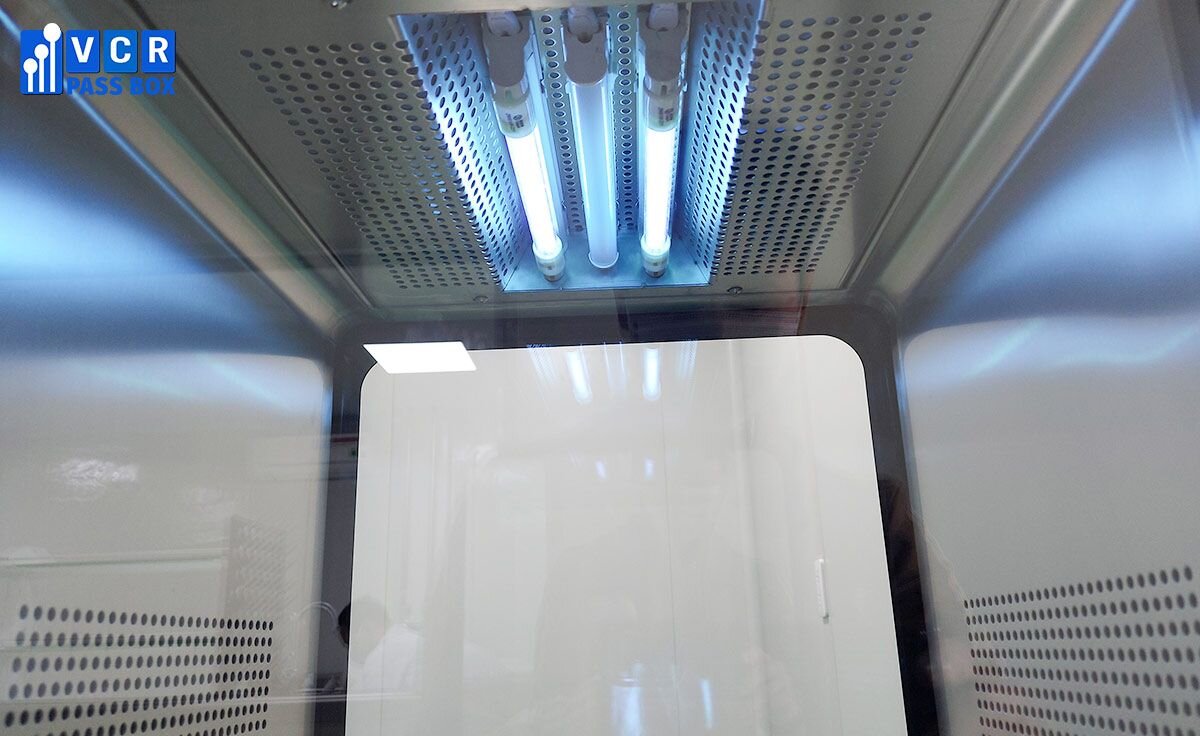
Read more: Latest price list of Passbox used in Cosmetics factory
2. Why Does the Cosmetics Industry Require a Standard-Compliant Pass Box?
In the cosmetics industry, every factor related to hygiene, safety and quality control is placed first. Therefore, the Pass Box is not only a material-transfer device but also an indispensable part of the clean-room system, helping factories ensure production standards and protect brand integrity.
Products directly affect the consumer
Cosmetic products such as creams, serums, toners, lipsticks… all come into direct contact with the face and body, and may even be used on sensitive skin areas. Just a small error in the process – such as bacterial contamination, dust or foreign particles – can:
-
Cause skin irritation, infection for users.
-
Lead to complaints, product recalls.
-
Negatively affect brand reputation.
Therefore, investing in a quality, hygienic Pass Box is a mandatory requirement for modern cosmetics plants.
Strict cleanliness requirements in cosmetics production
According to the guideline of ISO 22716 (Good Manufacturing Practices for Cosmetics), production zones must meet cleanliness levels from ISO Class 7 or higher. This means:
-
Strict control of personnel flow and material flow.
-
Minimizing door openings between zones of different cleanliness levels.
-
Having a dedicated material-transfer device – such as a Pass Box – to ensure materials are moved without disrupting the clean air flow.
Consequences if cross-contamination is not well controlled
Cross-contamination is one of the most serious risks in cosmetics manufacturing. If a standard Pass Box is not used, the following issues may occur: -
Foreign particles, fine dust, bacteria from the outside environment may get into the product.
-
Product formula instability, reduced efficacy or harm to users.
-
Violation of GMP standards, affecting export capability or bidding opportunities.
-
Increased risk of inspections, product recalls, production disruptions.
Investing in a standard-compliant Pass Box may be an initial cost, but it helps protect the production line, improve product quality and brand reputation in the long term.
Read more: Optimizing Dynamic Pass Box Operations: Comprehensive Use Guidelines
3. Criteria for Choosing a Pass Box for a Cosmetic Clean Room
Not all Pass Boxes are suitable for the highly hygienic, safety-critical and GMP-compliant environment of cosmetics manufacturing. When selecting this device, cosmetics factories must carefully consider the material, functionality and associated certifications.
-
Standard-compliant material: stainless steel 304 or 316L
Cosmetics often contain active ingredients, solvents or volatile essential oils, so the production environment can corrode ordinary metals. Therefore, the Pass Box should be made from:
-
Stainless steel 304: rust-resistant, easy to clean, suitable for most factories.
-
Stainless steel 316L: higher grade, better corrosion resistance—ideal for high humidity or stringent sterilization environments.
The interior and exterior surfaces should be finely polished, with no hidden corners, easy to clean and avoid bacterial accumulation.
-
Choose the appropriate type of Pass Box
Depending on the required level of control, the cosmetics factory can choose:
-
Basic Pass Box: for routine material transfer between two clean zones.
-
Pass Box with interlock: equipped with an interlock lock system, ensuring only one door can open at a time → preventing pressure cross-contamination.
-
UV Pass Box: integrates a UV lamp to sterilize material surfaces.
-
Pass Box with HEPA filter: creates a clean-air stream inside the transfer box, used for sensitive processes such as formulation and filling.
Note: It is recommended to choose a Pass Box that is easy to maintain and for which spare parts are easily replaced.
-
Size appropriate for the materials being transferred
The Pass Box should have an optimal size for the types of materials being transferred: from bottles, raw materials, to semi-finished products or packaged finished goods. Avoid choosing a box that is too large (wasting space) or too small (inconvenient to use). Common sizes include:
-
500 × 500 × 500 mm
-
600 × 600 × 600 mm
Custom fabrication is possible if required.
-
Certifications and quality inspection
For factories operating under a GMP system or producing under ISO 22716, having full documentation is essential:
-
Internal inspection report.
-
Installation and operation manuals (IQ/OQ).
-
Material certifications (CO, CQ) if needed for qualification dossiers.
These factors ensure the equipment meets requirements when quality inspection or supplier evaluation occurs.
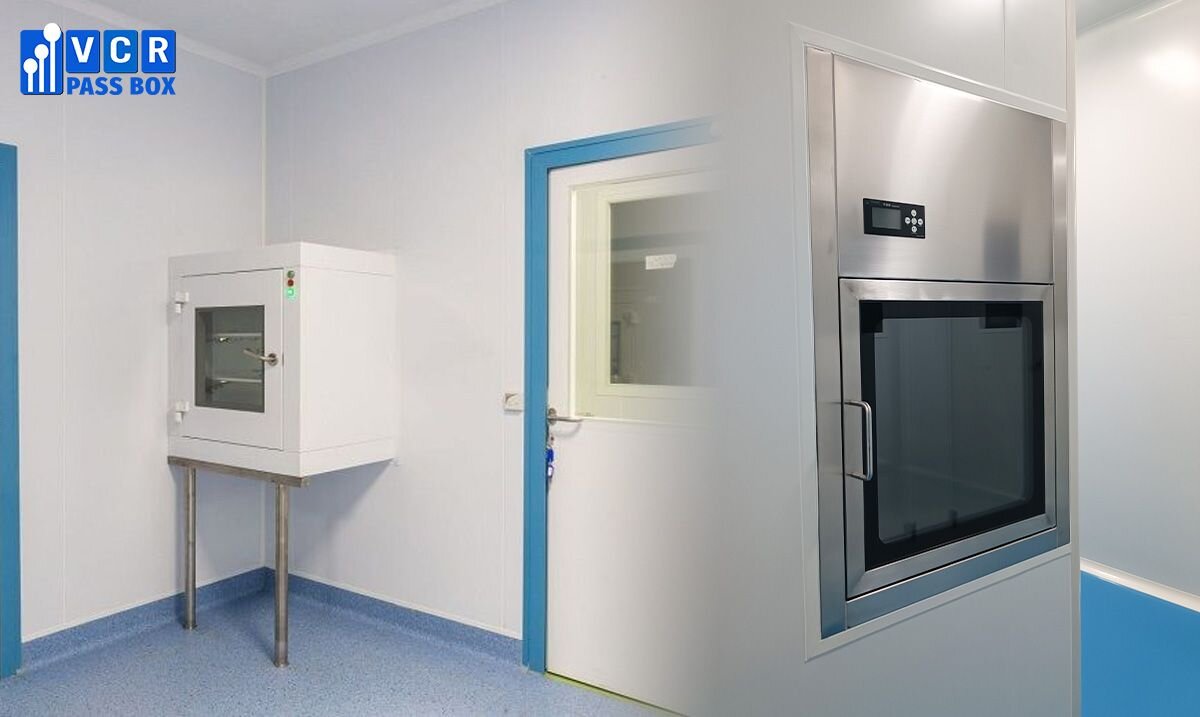
Read more: Mechanical Pass Box and Electronic Pass Box: Advantages and disadvantages of use
4. Trusted Supplier of Clean Room Pass Boxes for Cosmetics – VCR
When choosing a Pass Box for a cosmetics factory, finding a reputable pass box supplier who understands GMP requirements and the specific characteristics of the industry is key to ensuring operational effectiveness. With over 10 years of experience in clean-room equipment, VCR proudly serves as a trusted partner of many cosmetics enterprises in Vietnam.
VCR – Specialist in clean room equipment for the cosmetics industry
VCR supplies and fabricates equipment for clean rooms meeting GMP, ISO 14644, ISO 22716 standards… including: Pass Box, Air Shower, LAF cabinets, clean-work benches, consumables. With deep understanding of the distinctive processes in cosmetics manufacturing, VCR not only sells equipment – but also partners with customers in the clean-room setup process.
Advantages when choosing a cosmetics-industry Pass Box from VCR
-
Wide variety of models: from basic Pass Boxes to those with UV, interlock, HEPA – meeting all cleanliness levels.
-
Compliant with standards: the product is designed according to GMP, ISO requirements – can provide IQ/OQ, CO/CQ documentation if required.
-
On-site consultation: experienced engineers support surveying, advising the optimal solution for Pass Box location and type.
-
Nationwide delivery & installation: especially for factories in major industrial zones such as Bac Ninh, Long An, Binh Duong, Dong Nai.
-
Clear warranty, good after-sales support: always stocked with spare parts, periodic maintenance services as requested.
Read more: GMP standard Pass Box supplier for pharmaceutical factories
5. Pass Box Pricing in the Cosmetics Industry – What Does It Depend On?
The price of a Pass Box used in a cosmetics factory is not fixed; it varies depending on technical factors and specific requirements of each unit. Below are the factors directly influencing the quotation:
-
Type of Pass Box chosen
Each type of Pass Box has different structure, functions and costs:
-
Basic Pass Box: lowest cost, suitable for material transfer zones without sterilization requirement.
-
Pass Box with interlock: adds an interlock safety system, price is higher than the basic type.
-
UV Pass Box: integrates UV lamp for sterilizing surfaces, price is higher due to extra components and power supply.
-
Pass Box with HEPA filter: incorporates blow fan and filter to create ultra-clean air inside – used for sensitive steps such as formulation, filling → highest price.
-
Size and material by requirement
-
Larger size = higher cost due to more raw materials and manufacturing labour.
-
Material stainless steel 316L is more expensive than 304 but suitable for high corrosion resistance environment.
-
If mirror finish or special surface treatment is required, extra cost is calculated.
-
Order quantity
-
Larger order quantity helps optimise production cost, reduce unit price.
-
VCR offers preferential pricing for orders from 3 units or more, or for full factory-lot orders.
-
Required documentation, inspection
-
If the customer needs IQ/OQ documentation, CO/CQ, 2D/3D technical drawings, or internal certifications – additional cost will occur depending on level of detail.
-
For GMP qualification projects, having complete dossiers helps save approval time.
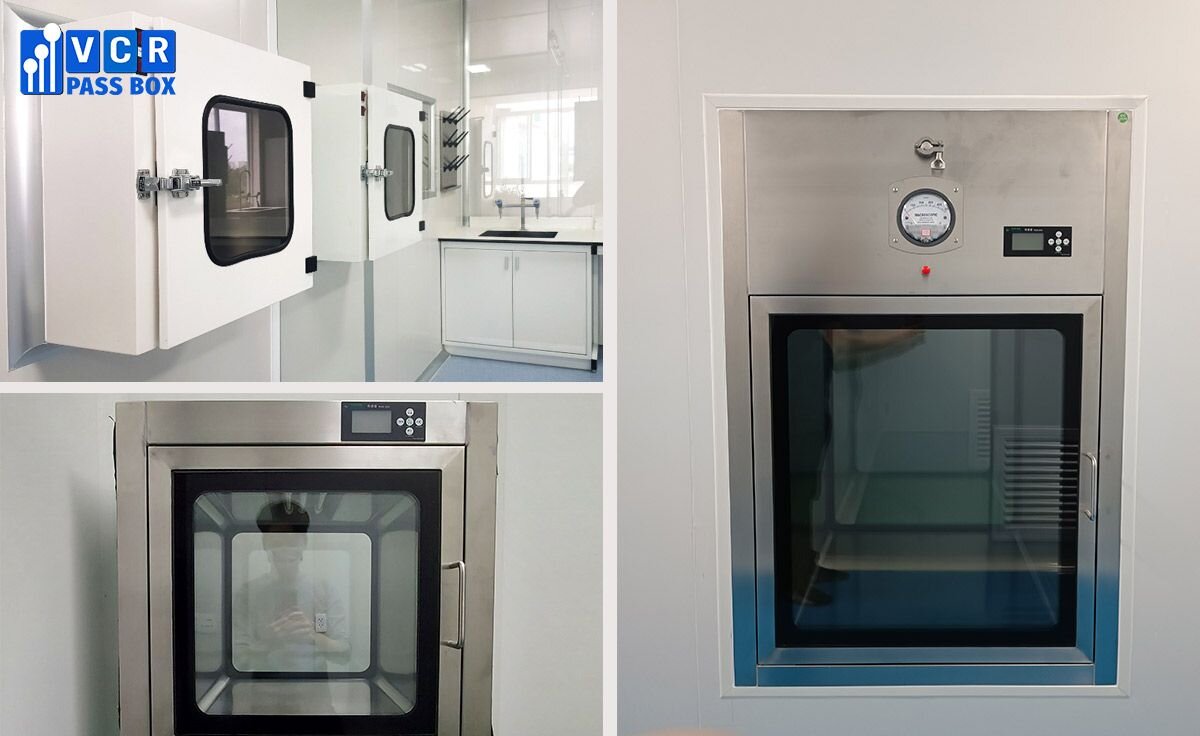
Read more: Supplier of Electronic Cleanroom Pass Boxes – Cross-Contamination Prevention, Anti-Static
6. FAQ – Frequently Asked Questions About Clean Room Pass Boxes for Cosmetics
Q: Is a UV Pass Box necessary for a cosmetics factory?
A: The answer depends on the microbial control level of the factory. If you are producing sensitive lines such as serums, creams or preservative-free products, then a Pass Box integrated with UV lamp is a necessary choice. UV light helps sterilize the surfaces of materials before moving into the clean area, improving cross-contamination control.
Q: Where is the most appropriate place to install a Pass Box in the cosmetics production process?
A: The Pass Box should be installed at the intersection between two zones with different cleanliness levels, for example:
-
From raw-material warehouse → formulation area
-
From formulation area → filling/packaging area
-
From production room → QC room or finished-goods warehouse
A correct installation location supports one-way material flow, minimises cross-contamination and ensures GMP-compliant process.
Q: Can a Pass Box be customised?
A: Absolutely. VCR accepts design and manufacture of Pass Boxes to custom sizes, special functions (interlock, UV, HEPA, sensors…) and tailored to the plant layout of each cosmetics factory. We also provide detailed technical drawings for customer review before installation.
Are you looking for a GMP-compliant Pass Box for your cosmetics factory?
Don’t let cross-contamination affect your product quality and brand reputation.
Contact VCR today for expert consultation, customized design options, and a detailed quotation.
Contact:
Hotline: 090.123.9008
Email: [email protected]
Website: https://passbox.vn/
Dat VCR




